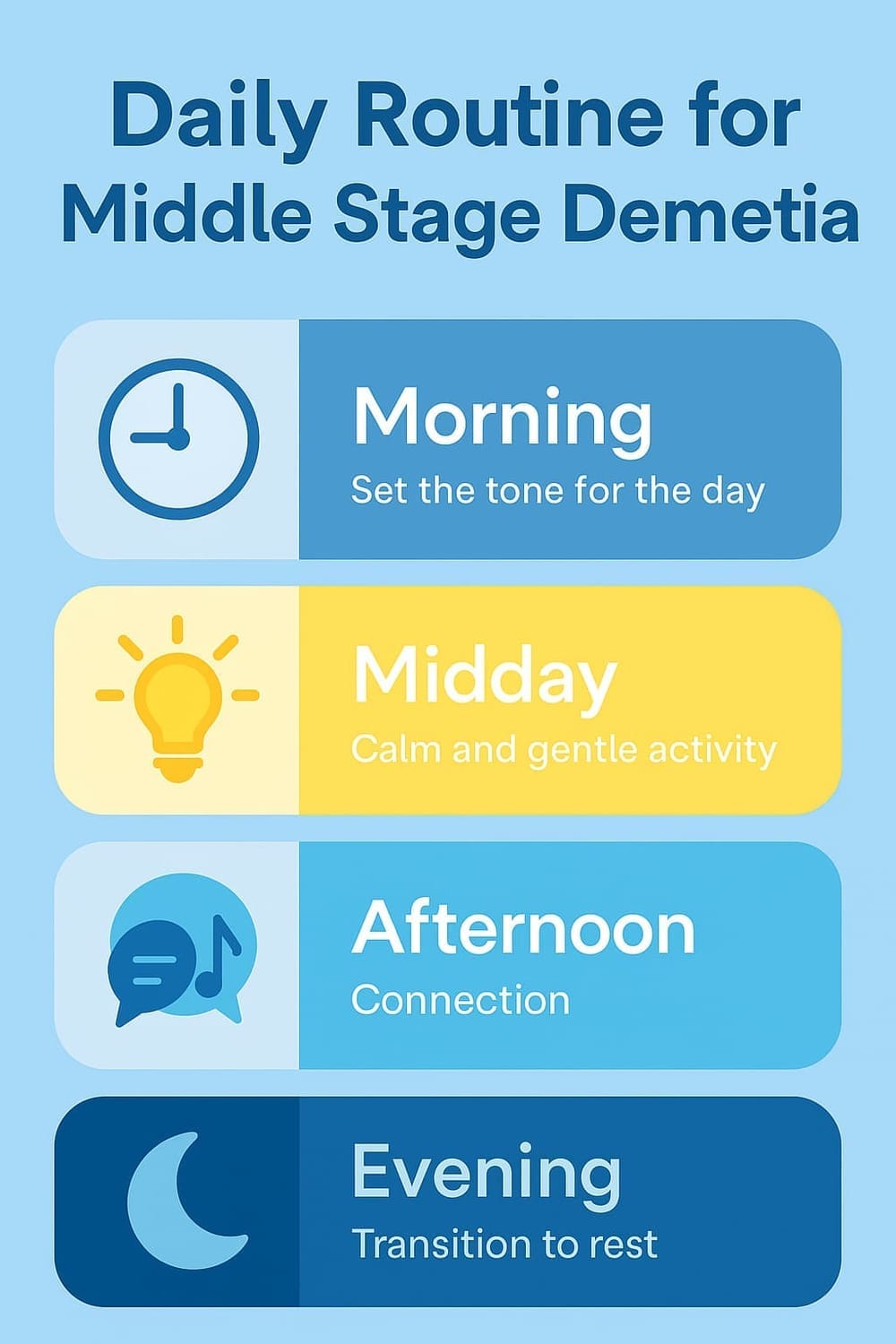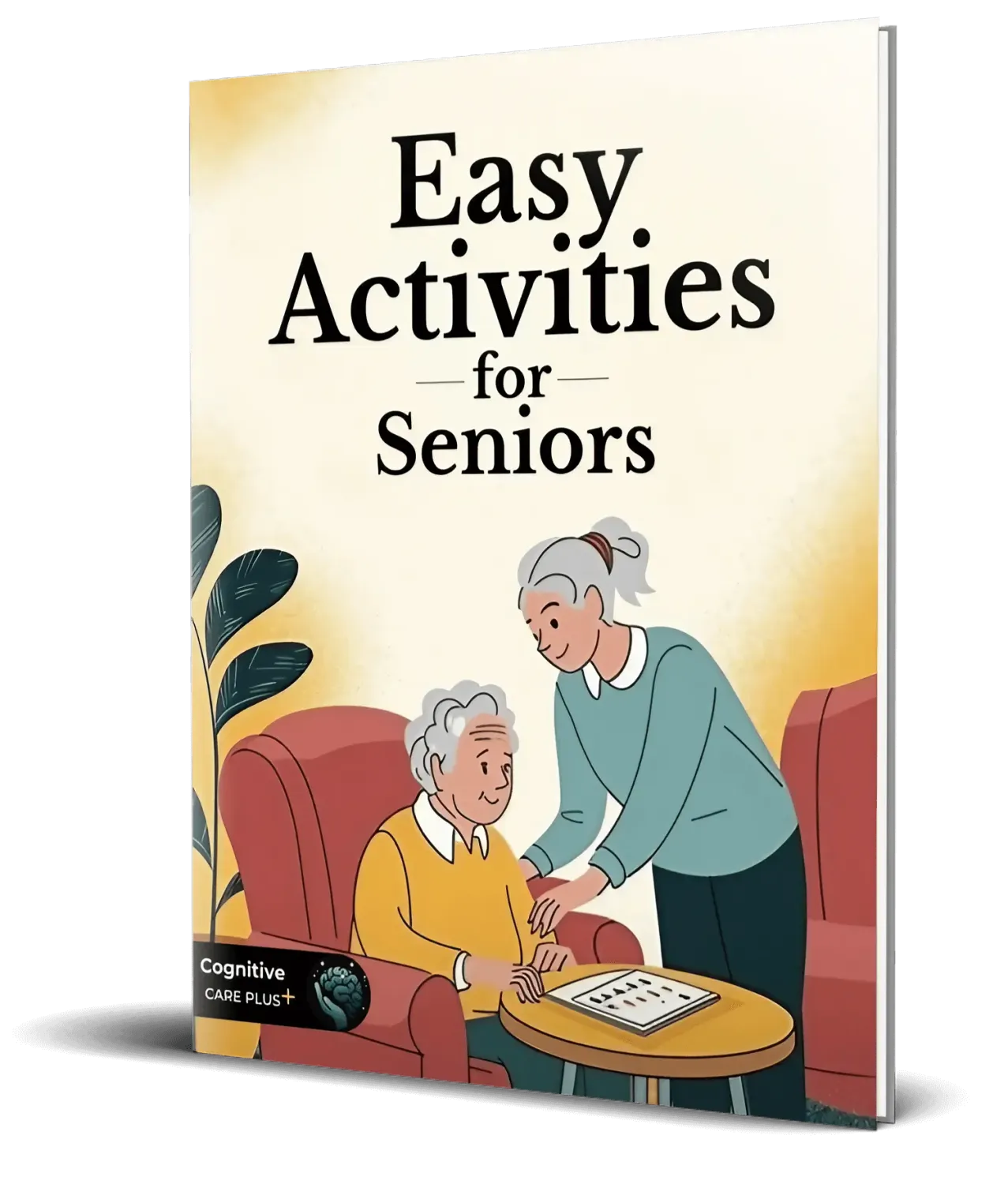Daily Routines for Middle Stage Dementia: Reduce Confusion and Stress
Are you feeling exhausted trying to keep each day organized with your loved one?
If you’re caring for someone in the middle stage of dementia, you know how quickly a day can spiral out of control. Sometimes, you may wonder, “How can I reduce daily stress and confusion?” I understand you. When I cared for my mother, I discovered that routine wasn’t a luxury—it was a lifeline.
Today, I’ll share how simple daily routines can reduce confusion and stress for both you and your loved one.
🎧 Prefer to listen? Play our podcast episode below to learn how daily routines can reduce confusion and stress during middle-stage dementia, making caregiving days calmer and easier.
✨ Enjoyed the episode?
Subscribe to the Cognitive Care Plus Podcast for practical guides, expert insights, and compassionate support to help you care for your loved one with dementia.
Why do routines help during middle-stage dementia?
During this stage, mood swings, disorientation, and anxiety are common. For your loved one, each day can feel like a confusing puzzle. Routines:
Provide predictable structure that lowers anxiety.
Reduce the number of daily decisions needed.
Help prevent challenging behaviors caused by fear and confusion.
Support a sense of independence.
Imagine starting each morning the same way: a warm bath, soft music in the background, breakfast in the same chair, and a gentle reminder of the day's activities with a smile.
This won’t erase all challenges, but it will create a safe space where both of you can breathe.
How to create an effective daily routine
Here is a simple, adaptable structure to help your day flow more smoothly:
🕗 Morning: Set the tone for the day
Wake up at the same time each day.
Let in natural light and play soft music upon waking.
Follow the same hygiene routine: bath, teeth brushing, getting dressed.
Provide a nutritious breakfast with easy-to-eat foods.
Include a short walk or gentle stretching.
🕛 Midday: Calm and gentle activity
Meaningful activities: folding towels, light gardening, coloring, looking at a photo album.
Lunch at a consistent time.
Short nap or quiet rest to prevent overtiredness.
🕔 Afternoon: Calm connection
Simple memory games or favorite music.
Light snack.
Calm conversations or sensory activities (sensory blanket, therapy plush, aromatherapy).
🌙 Evening: Transition to rest
Early, light dinner.
Avoid screens before bed, opt for soft music or reading aloud.
Nighttime hygiene routine.
Consistent bedtime with dim lighting.
For additional guidance, the Alzheimer’s Association offers a clear guide on daily care plans to help caregivers create structured, comforting routines for individuals living with dementia.
Practical tips to keep the routine going
Creating a routine is one thing, but sticking to it can be challenging, especially on tough days. Don’t worry—every caregiver faces moments when plans fall apart, and that’s okay.
Want to see what a calm, structured day can look like for someone in the middle stage of dementia? Watch this short, practical video for inspiration on setting up a daily routine that supports independence while reducing stress and confusion:
“Dementia Routine: Managing Time & Routines” (Oma’s Applesauce)
Here are some practical tips to keep your routine going:
Keep wake-up and bedtime consistent. Even if the day doesn’t go as planned, starting and ending the day at the same time helps your loved one feel secure.
Offer simple choices. Let them choose between two shirts or what cup to use. This small control can reduce resistance.
Use visual cues. Clocks, calendars, or a whiteboard can help your loved one know what to expect.
Keep a comfort kit handy (soft blanket, plush, light-scented lotion).
Use alarms or sound reminders if your loved one responds well to sounds.
Plan calm activities between tasks. Reading, listening to music, or gentle stretching can ease transitions.
Be flexible. If your loved one is tired or upset, skip non-essential tasks. The goal is calm, not perfection.
Praise cooperation, not performance. Celebrate small successes, like brushing teeth or getting dressed, even if it takes longer.
Prepare for “off” days. Have easy, comforting activities ready, like folding towels or looking through photo albums, for days when nothing else works.
Remember: Your loved one may not always remember the routine, but the calm and predictability you create can reduce confusion and stress, making each day smoother for both of you.
Try Our Routine Troubleshooting Tool
Is your loved one showing challenging behaviors despite your best efforts?
Our Routine Troubleshooting Tool can help you match specific activities to specific behaviors, helping you reduce stress and confusion for your loved one while making your caregiving day smoother.
If your loved one shows [X behavior], try [Y activity]—this tool makes it easier to adjust your daily routine with calm and confidence.
🩵 Want more free tools to make caregiving smoother? Join our list and get practical resources delivered to your inbox.
What if something interrupts the routine?
Life doesn’t always allow for perfect consistency. If plans change, give a simple, calm heads-up:
“Today we will visit the doctor, then we will have your favorite coffee.”
Stay calm and smile. Your energy helps your loved one feel secure, even when plans change.
Final reflection
You know your loved one best. Routines don’t mean rigidity; they mean consistency that brings calm within confusion. As caregivers, we can’t remove all hard moments, but we can create moments of peace each day.
Ask yourself today:
“What small change can I make tomorrow to help our day feel calmer and more predictable?”
Resources to help you
For additional guidance on creating and maintaining daily routines, the Alzheimer Society of Canada offers practical advice on setting routines and reminders to support day-to-day dementia care.
You can also explore these related resources:
Free Caregiver Routine Planner (Download)
You may also find it helpful to explore our guide on Essential Products to Support Daily Life in Middle-Stage Dementia, featuring practical items that can reduce stress and support daily routines for your loved one.
FAQ
Stay calm and offer small choices within the routine. Sometimes, allowing your loved one to choose a cup or activity can help.
It’s normal. Breathe, keep only essential parts of the routine, and let go of what isn’t needed that day.
Because it lowers anxiety, reduces confusion, encourages cooperation, and brings calm to both your loved one and yourself.
Share this article:
If this article helped you, share it with other caregivers who need encouragement.
💬 We’d love to hear from you!
Have you tried creating a daily routine for your loved one with dementia? What has worked for you, and what challenges have you faced? Share your thoughts and tips in the comments below—your experience could help another caregiver feel less alone on this journey.

Trending
Simple tools that make caregiving...
Turning simple play into a brain-boosting activity...
Here’s what to look for when choosing...

About me

Hi there 👋 My name is George Cassou, I'm a psychologist and the creator of this blog. Inspired by my journey caring for my mom with Alzheimer's, I share activities and tips to bring joy and connection.

Affiliate Disclosure:
This website contains affiliate links. If you click on these links and make a purchase, we may earn a small commission at no additional cost to you. These commissions help us keep this site running and allow us to continue creating helpful content to support caregivers and families.





